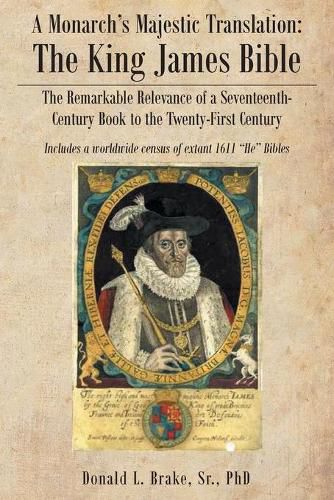Readings Newsletter
Become a Readings Member to make your shopping experience even easier.
Sign in or sign up for free!
You’re not far away from qualifying for FREE standard shipping within Australia
You’ve qualified for FREE standard shipping within Australia
The cart is loading…






This title is printed to order. This book may have been self-published. If so, we cannot guarantee the quality of the content. In the main most books will have gone through the editing process however some may not. We therefore suggest that you be aware of this before ordering this book. If in doubt check either the author or publisher’s details as we are unable to accept any returns unless they are faulty. Please contact us if you have any questions.
Donald L. Brake quantifies the legacy of this remarkable tome’s unique place in history. The 1611 King James Version is the cornerstone and linchpin for all subsequent English translations. He vividly portrays the quality of this seventeenth-century translation as that of precision, enchantment, and passion of a sacred book that has shaped human history for more than two thousand years. He recounts details that emphasize its use of a metric style and rhythm generating a lyrical masterpiece with a compelling resonance for public reading.
The KJV’s mastery of English expression and its seemingly endless staying power is unparalleled among modern versions. Using thorough comparisons of editions and versions, the author has researched the KJV with the goal of an honest and reasoned approach to the ever-debated value of the popular, but outdated Authorized Version.
Brake’s study prompted him to do a worldwide census of surviving 1611 He Bibles (identified from Ruth 3:15: … and he went into the city. ). His purpose was to establish a pedigree of sorts by recording for each copy an exhaustive description eliminating much of the risk of confusion in identifying the nearly 200 extant copies. He cautions that the value of any original KJV depends on a positive identification of authenticity.
Brake’s work confirms the premise that the literary merits and conscientious translation of a seventeenth-century book has profound twenty-first century relevance.
$9.00 standard shipping within Australia
FREE standard shipping within Australia for orders over $100.00
Express & International shipping calculated at checkout
This title is printed to order. This book may have been self-published. If so, we cannot guarantee the quality of the content. In the main most books will have gone through the editing process however some may not. We therefore suggest that you be aware of this before ordering this book. If in doubt check either the author or publisher’s details as we are unable to accept any returns unless they are faulty. Please contact us if you have any questions.
Donald L. Brake quantifies the legacy of this remarkable tome’s unique place in history. The 1611 King James Version is the cornerstone and linchpin for all subsequent English translations. He vividly portrays the quality of this seventeenth-century translation as that of precision, enchantment, and passion of a sacred book that has shaped human history for more than two thousand years. He recounts details that emphasize its use of a metric style and rhythm generating a lyrical masterpiece with a compelling resonance for public reading.
The KJV’s mastery of English expression and its seemingly endless staying power is unparalleled among modern versions. Using thorough comparisons of editions and versions, the author has researched the KJV with the goal of an honest and reasoned approach to the ever-debated value of the popular, but outdated Authorized Version.
Brake’s study prompted him to do a worldwide census of surviving 1611 He Bibles (identified from Ruth 3:15: … and he went into the city. ). His purpose was to establish a pedigree of sorts by recording for each copy an exhaustive description eliminating much of the risk of confusion in identifying the nearly 200 extant copies. He cautions that the value of any original KJV depends on a positive identification of authenticity.
Brake’s work confirms the premise that the literary merits and conscientious translation of a seventeenth-century book has profound twenty-first century relevance.